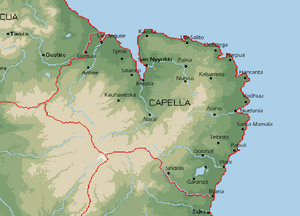Capella
Federation of Capella | |
|---|---|
|
Flag | |
 | |
| Capital | San Nyyrikki |
| Official languages | Capellan |
| Demonym(s) | Capellan |
| Government | Presidential Federal Republic |
• President | Esetban De La Iivo Tikkanen Heikkilä |
| Legislature | Senate |
| Population | |
• 2024 census | 122,873,359 |
| GDP (PPP) | estimate |
• Total | $1.14 trillion |
• Per capita | $9,352 |
| Currency | Selona |
| Driving side | right |
Capella, officially the Federation of Capella, (Capellan: Federación de Capella), also known as the Capellan Federation (Capellan: Federación Capellana) is a country located in eastern Abyaala in Septentrion. It is bordered by Idacua to the north, Calafia to the south, and the Meridian Ocean to the east. The Federation is divided into eight constituent states, and a special administration zone around the capital The capital of San Nyyrikki is also the country's largest city, serving as the main cultural and financial center of the nation. Other major urban areas include Kaaska, Los Salito, Hanranta, Nuelania, San Jequile, and Yloni. The total population as of 2024 was 122 million.
Capellan culture and society is a unique fusion of Hispanic, indigenous Abyaalan, and Finno-Uralic influence brought about by the country's history. Capella has been home to human habitation since at least the 10th Century BCE. The Tukiban Civilization arose sometime in the 2nd Century BCE and ruled over most of Capella until the 8th Century, after which it fractured into smaller factions. The resultant infighting paved the way for the rise of the Maraqani Empire in the 10th Century, which ruled over most the region until the arrival of Svlyvan exploratory expeditions in the 16th Century. The ensuing colonial conflict between the Sylvan Kingdom and the Maraqani lasted for sixty years before the dissolution of the Empire into successor states. The slow rate of encroachment allowed for a high level of admixture between Sylvan colonists and the native Abyaalan people, and a relatively peaceful relationship developed. The resulting general stability made Capella a major destination for Christian migrants and refugees fleeing prosecution in the Hallian sphere, creating a large Finno-Uralic influence in the country.
The increasingly complex multicultural society that developed between the 16th and 18th centuries gradually led to increased calls for independence from Sylva. The first effort an independence, known as Valkoiset pojat (White Sons) Rebellion, lasted between 1784-1801 but was defeated by colonial authorities with assistance from Sylva. Sylvan influence nevertheless began to fade into the 19th Century, exasperated by the rise of international socialism in the early 20th Century which appealed strongly to colonial subjects across Septentrion. In 1915 growing anti-Colonial sentiment, inflamed by the outbreak of the War of Sylvan Succession, prompted the beginning of the Capellan Civil War in 1915. Intervention from the Federated Fire Territories, a growing anti-monarchist trend within much of the populace, and agitation over the rise and impact of socialism eventually led the civil war to becoming a war of independence, culminating in the formation of the Capellan Republic in 1920. A low level insurgency by communist rebels prompted further support for Fryland and Syvla in the following decades, which also worsened ties with neighboring Idacua and Calafia. After three decades of one party rule under the Republican Coalition civil unrest in the 1950s led to intervention by Fyrland, resulting in the Década sangrienta, or "Bloody Decade". After several years of growing prominence the left-wing People's Assembly won the 1966 election, however before the Senate could be seated the Assembly was overthrown in a military coup, resulting in a brief but violent second civil war from 1966-1968. In 1970 the Prosperous Union Party (PUP) took power and reformed the Republic into the Federation, and has remained in power since.
Capella is considered a developing state with a GDP of $1.2 trillion, with an economic focus on textiles, mining, fishing, lumber, manufacturing, and agriculture. Although regular elections take place, power has been held by the Prosperous Union Party since the reformation, leading many foreign observers to classify Capella as an illiberal one party state. Criticism of PUP's leadership has focused on the poor track record of civil rights, namely freedom of speech and assembly. Capella is heavily militarized for its size, owing to its historically poor relations with neighboring Idacua and Calafia. Capella has often been regarded as the principle anti-socialist state in Abyaala, and continues to maintain close relations with Fyrland.
